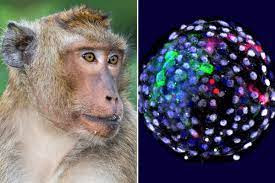Scientists injected dozens of human stem cells into developing monkey embryos, and the resulting hybrids survived for up to 20 days in lab dishes.
These human-monkey embryos could someday serve as helpful models for human disease, embryonic development and aging, the study authors noted in a new report, published April 15 in the journal Cell. By zooming in on the interaction of human and animal cells in the embryos, scientists could also learn how to help human cells survive amongst animal cells, potentially advancing the effort to grow human organs in living animal models.
Such studies would offer a window into human biology that would otherwise require experimenting on humans, making such studies currently impossible. Of course, the development of human-animal chimeras — organisms that contain cells from two or more species — raises its own ethical concerns, especially in regard to how long such embryos should be allowed to develop.
In the past, scientists have attempted to incorporate human stem cells into pig and sheep embryos, with the eventual goal of growing human organs in the livestock for use in transplant surgeries, Science Magazine reported. But very few human cells survived the experiments. TO READ ENTIRE ARTICLE, CLICK HERE...
Having already lived over three-quarters of my life, I want to share my perspectives as to how I have treated life or life has treated me.
Subscribe to:
Post Comments (Atom)
BEGINNING TODAY
All postings for this blog will appear on my blog: JOURNAL FOR DAILY PAGES.... all of the internal page links have been switched. This bl...
-
Eisenhower proposes NASA to Congress Why 1958 ? That was the year that the Hulu Hoop was invested. I was 11 years old... What was i...
-
How many alien civilizations are out there? A new galactic survey holds a clue. The Milky Way is full of habitable real estate, with roughl...


No comments:
Post a Comment